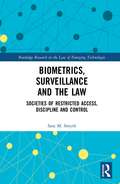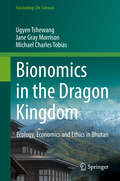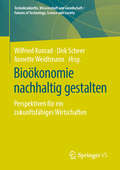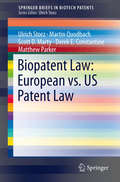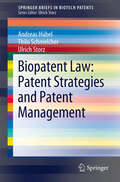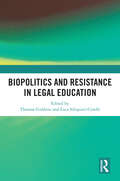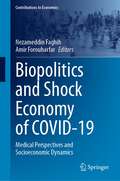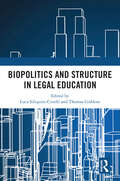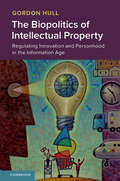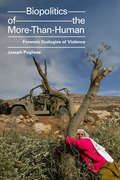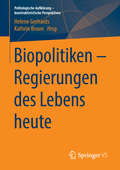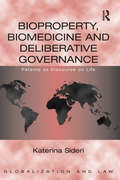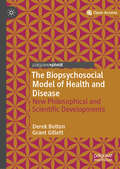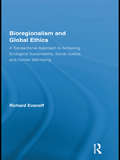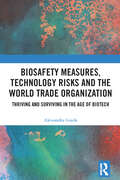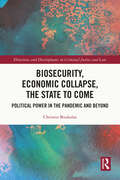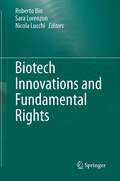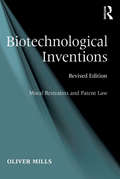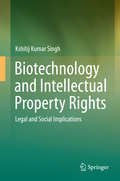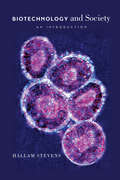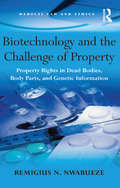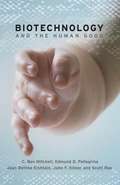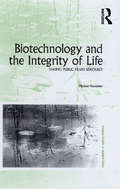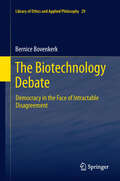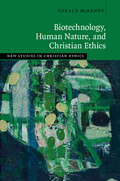- Table View
- List View
Biometrics, Surveillance and the Law: Societies of Restricted Access, Discipline and Control (Routledge Research in the Law of Emerging Technologies)
by Sara M. SmythThe use of biometric identification systems is rapidly increasing across the world, owing to their potential to combat terrorism, fraud, corruption and other illegal activities. However, critics of the technology complain that the creation of an extensive central register of personal information controlled by the government will increase opportunities for the state to abuse citizens. There is also concern about the extent to which data about an individual is recorded and kept. This book reviews some of the most current and complex legal and ethical issues relating to the use of biometrics. Beginning with an overview of biometric systems, the book goes on to examine some of the theoretical underpinnings of the surveillance state, questioning whether these conceptual approaches are still relevant, particularly the integration of ubiquitous surveillance systems and devices. The book also analyses the implementation of the world’s largest biometric database, Aadhaar, in detail. Additionally, the identification of individuals at border checkpoints in the United States, Australia and the EU is explored, as well as the legal and ethical debates surrounding the use of biometrics regarding: the war on terror and the current refugee crisis; violations of international human rights law principles; and mobility and privacy rights. The book concludes by addressing the collection, use and disclosure of personal information by private-sector entities such as Axciom and Facebook, and government use of these tools to profile individuals. By examining the major legal and ethical issues surrounding the debate on this rapidly emerging technology, this book will appeal to students and scholars of law, criminology and surveillance studies, as well as law enforcement and criminal law practitioners.
Bionomics in the Dragon Kingdom: Ecology, Economics and Ethics in Bhutan (Fascinating Life Sciences)
by Ugyen Tshewang Jane Gray Morrison Michael Charles TobiasThis compact and elegant work (equally fitting for both academic as well as the trade audiences) provides a readily accessible and highly readable overview of Bhutan’s unique opportunities and challenges; all her prominent environmental legislation, regulatory statutes, ecological customs and practices, both in historic and contemporary terms. At the same time, Bionomics places the ecological context, including a section on animal rights in Bhutan, within the nation’s Buddhist spiritual and ethical setting. Historic contextualization accents the book’s rich accounting of every national park and scientific reserve, as well as providing up-to-the-minute climate-change related hurdles for the country.Merging the interdisciplinary sciences, engineering and humanities data in a compelling up-to-date portrait of the country, the authors have presented this dramatic compendium against the backdrop of an urgent, global ecological time-frame. It thus becomes clear that the articulated stakes for Bhutan, like her neighboring Himalayan and Indian sub-continental countries (China, India, Bangladesh and Myanmar) are immense, as the Anthropocene epoch unfolds, affecting every living being across the planet. Because Bhutan’s two most rewarding revenue streams derive from the sale of hydro-electric power and from tourism, the complexities of modern pressures facing a nation that prides herself on maintaining traditional customs in what has been a uniquely isolated nation are acute.
Bioökonomie nachhaltig gestalten: Perspektiven für ein zukunftsfähiges Wirtschaften (Technikzukünfte, Wissenschaft und Gesellschaft / Futures of Technology, Science and Society)
by Wilfried Konrad Dirk Scheer Annette WeidtmannIn diesem Sammelband werden die Herausforderungen und Potenziale einer zukünftig nachhaltig zu gestaltenden Bioökonomie interdisziplinär beleuchtet. Hierbei wird die Bioökonomie als sozio-technisches System aufgefasst, in dem die technische Ausgestaltung aufs Engste mit sozialen, ökonomischen und politischen Elementen verknüpft ist. Aus unterschiedlichen Perspektiven wird die Transformation des herkömmlichen Wirtschaftens in Richtung einer bioökonomischen Wirtschaftsweise thematisiert. Aspekte von Umbau bzw. Transformation und Zukunftsgestaltung stehen dabei im Mittelpunkt.
Biopatent Law: European Patent Law Vs. Us Patent Law (SpringerBriefs in Biotech Patents)
by Matthew Parker Ulrich Storz Martin Quodbach Scott D. Marty Derek E. ConstantineSpringerBriefs in Biotech Patents presents timely reports on intellectual properties (IP) issues and patent aspects in the field of biotechnology. This volume focus on particular aspects of the US patent law, which can have tremendous differences compared to the European law. This includes questions of biopatent prosecution, novelty, inventive step, written disclosure and sufficiency of enablement as well as questions of law enforcement of biotech patents.
Biopatent Law: Patent Strategies And Patent Management (SpringerBriefs in Biotech Patents)
by Ulrich Storz Andreas Hübel Thilo SchmelcherPatents protecting biotechnological invention are becoming ever more important. Because biotechnology has many differences with respect to other technologies, lessons learned in other fields of technology cannot simply be transferred to adopt a suitable strategy for dealing with biotechnology inventions. In this volume, general aspects of biopatent law will be discussed. This involves questions of patentability, including ethical issues and issues of technicality, as well as questions of patent exhaustion in cases were reproducible subject matter, like cells or seeds, is protected. Moreover, active and passive patent strategies are addressed. Further, insight will be given into patent lifetime management and additional protective measures, like supplementary protection certificates and data exclusivity. Here, strategies are discussed how market exclusivity can be extended as long as possible, which is particularly important for biopharmaceutical drugs, which create high R&D costs.
Biopolitics and Resistance in Legal Education
by Thomas Giddens and Luca Siliquini-CinelliTaking up the study of legal education in distinctly biopolitical terms, this book provides a critical and political analysis of resistance in the law school. Legal education concerns the complex pathways by which an individual becomes a lawyer, making the journey from lay-person to expert, from student to practitioner. To pose the idea of a biopolitics of legal education is not only to recognise the tensions surrounding this journey but also to recognise that legal education is a key site in which the subject engages, and is engaged by, a particular structure—and here the particular structure of the law school. This book explores the resistance to that structure, including: different ways in which law’s pedagogic structures might be incomplete, or are being fought against; the use of less conventional elements of cultural discourse to resist the abstraction of the lawyer in students’ subject formation; the centralisation of queer and feminist discourses to disrupt the hierarchies of the legal curriculum; the use of digital technologies; the place of embodiment in legal education settings; and the impacts of posthuman knowledges and contexts on legal learning. Assembling original, field-defining essays by both leading international scholars and emerging researchers, this book constitutes an indispensable resource in legal education research and scholarship that will appeal to legal academics everywhere.
Biopolitics and Shock Economy of COVID-19: Medical Perspectives and Socioeconomic Dynamics (Contributions to Economics)
by Nezameddin Faghih Amir ForouharfarThis edited volume discusses the biopolitics and shock economy of COVID-19, emphasizing medical perspectives and the socioeconomic dynamics of the pandemic and the ensuing institutional responses. Written by an international, multidisciplinary group of academic and professional experts, chapters embrace a wide range of topics such as: medical perspectives on COVID-19; application of geospatial technology; infectivity, immunogenicity, and disease as important factors for adoption of relevant biopolitical measures; shock economy; COVID-19-induced transaction costs; social support and resilience of inhabitants of marginalized areas; business resilience factors; entrepreneurship; and digital transformation. Jointly addressing global examples of biopolitical governance and overarching macroeconomic effects of the pandemic, this volume will be of interest to academics across disciplines as well as policymakers and practitioners on the ground.
Biopolitics and Structure in Legal Education
by Luca Siliquini-Cinelli and Thomas GiddensTaking up the study of legal education in distinctly biopolitical terms, this book provides a critical and political analysis of structure in the law school. Legal education concerns the complex pathways by which an individual becomes a lawyer, making the journey from lay-person to expert, from student to practitioner. To pose the idea of a biopolitics of legal education is not only to recognise the tensions surrounding this journey, but also to recognise that legal education is a key site in which the subject engages, and is engaged by, a particular structure—and here the particular structure of the law school. This book explores that structure by addressing the characteristics of the biopolitical orders engaged in legal education, including: understanding the lawyer as a commodity, unpicking the force relations in legal education, examining the ways codes of conduct in higher education impact academic freedom, as well as putting the distinctly Western structures of legal learning within a wider context. Assembling original, field-defining essays by both leading international scholars and emerging researchers, it constitutes an indispensable resource in legal education research and scholarship that will appeal to legal academics everywhere.
The Biopolitics of Intellectual Property: Regulating Innovation and Personhood in the Information Age
by Gordon HullAs a central part of the regulation of contemporary economies, intellectual property (IP) is central to all aspects of our lives. It matters for the works we create, the brands we identify and the medicines we consume. But if IP is power, what kind of power is it, and what does it do? Building on the work of Michel Foucault, Gordon Hull examines different ways of understanding power in copyright, trademark and patent policy: as law, as promotion of public welfare, and as promotion of neoliberal privatization. He argues that intellectual property policy is moving toward neoliberalism, even as that move is broadly contested in everything from resistance movements to Supreme Court decisions. This work should be read by anyone interested in understanding why the struggle to conceptualize IP matters.
Biopolitics of the More-Than-Human: Forensic Ecologies of Violence (ANIMA: Critical Race Studies Otherwise)
by Joseph PuglieseIn Biopolitics of the More-Than-Human Joseph Pugliese examines the concept of the biopolitical through a nonanthropocentric lens, arguing that more-than-human entities—from soil and orchards to animals and water—are actors and agents in their own right with legitimate claims to justice. Examining occupied Palestine, Guantánamo, and sites of US drone strikes in Afghanistan, Pakistan, Somalia, and Yemen, Pugliese challenges notions of human exceptionalism by arguing that more-than-human victims of war and colonialism are entangled with and subject to the same violent biopolitical regimes as humans. He also draws on Indigenous epistemologies that invest more-than-human entities with judicial standing to argue for an ethico-legal framework that will enable the realization of ecological justice. Bringing the more-than-human world into the purview of justice, Pugliese makes visible the ecological effects of human war that would otherwise remain outside the domains of biopolitics and law.
Biopolitiken – Regierungen des Lebens heute: Regierungen Des Lebens Heute (Politologische Aufklärung – konstruktivistische Perspektiven)
by Helene Gerhards Kathrin BraunDas Buch versammelt konstruktivistische Perspektiven auf das Konzept „Biopolitik“. Dadurch werden die Analysepotentiale für aktuelle Phänomene, die den Zusammenhang zwischen dem Leben und dem Lebendigen und der Regierbarmachung betreffen, ausgelotet. Im Fokus stehen die Strategien und die Objekte der Regierungs- und Regulierungsbemühungen: In welcher Weise werden gesellschaftliche Probleme konstruiert und bestimmten „Zielscheiben“ zugeschrieben? Welche Subjektivierungsformen lassen sich im Rahmen biopolitischer Zugriffe ausmachen? Inwiefern spielen spezifische sozialtheoretische Überlegungen und Konzeptionen von Zeit für biopolitische Strategien und Konflikte eine Rolle? An welchen Gegenständen sind die fortdauernden Konflikte, die sich im Spannungsfeld zwischen Medizin, Ethik und Politik ergeben, zu explizieren?
Bioproperty, Biomedicine and Deliberative Governance: Patents as Discourse on Life (Globalization And Law Ser.)
by Katerina SideriBiomedical patents have been the subject of heated debate. Regulatory agencies such as the European Patent Office make small decisions with big implications, which escape scrutiny and revision, when they decide who has access to expensive diagnostic tests, whether human embryonic stem cells can be traded in markets, and under what circumstances human health is more important than animal welfare. Moreover, the administration of the Trade Related Aspects of Intellectual Property Rights by the World Trade Organization has raised considerable disquiet as it has arguably created grave health inequities. Those doubting the merits of the one size fits all approach ask whether priority should be given to serving the present needs of populations in dire need of medication or to promoting global innovation. The book looks in detail into the legal issues and ethical debates to ask the following three main questions: First, what are the ideas, goals, and broader ethical visions that underpin questions of governance and the legal reasoning employed by administrative agencies? Second, how can we democratize the decision making process of technocratic institutions such as the European Patent Office? Finally, how can we make the global intellectual property system more equitable? In answering these questions the book seeks to contribute to our understanding of the role and function of regulatory agencies in the regulation of the bioeconomy, explains the process of interpretation of legal norms, and proposes ways to rethink the reform of the patent system through the lens of legitimacy.
The Biopsychosocial Model of Health and Disease: New Philosophical and Scientific Developments
by Derek Bolton Grant GillettThis open access book is a systematic update of the philosophical and scientific foundations of the biopsychosocial model of health, disease and healthcare. First proposed by George Engel 40 years ago, the Biopsychosocial Model is much cited in healthcare settings worldwide, but has been increasingly criticised for being vague, lacking in content, and in need of reworking in the light of recent developments. The book confronts the rapid changes to psychological science, neuroscience, healthcare, and philosophy that have occurred since the model was first proposed and addresses key issues such as the model’s scientific basis, clinical utility, and philosophical coherence. The authors conceptualise biology and the psychosocial as in the same ontological space, interlinked by systems of communication-based regulatory control which constitute a new kind of causation. These are distinguished from physical and chemical laws, most clearly because they can break down, thus providing the basis for difference between health and disease. This work offers an urgent update to the model’s scientific and philosophical foundations, providing a new and coherent account of causal interactions between the biological, the psychological and social.
Bioregionalism and Global Ethics: A Transactional Approach to Achieving Ecological Sustainability, Social Justice, and Human Well-being
by Richard EvanoffWhile a number of schools of environmental thought — including social ecology, ecofeminism, ecological Marxism, ecoanarchism, and bioregionalism — have attempted to link social issues to a concern for the environment, environmental ethics as an academic discipline has tended to focus more narrowly on ethics related either to changes in personal values or behavior, or to the various ways in which nature might be valued. What is lacking is a framework in which individual, social, and environmental concerns can be looked at not in isolation from each other, but rather in terms of their interrelationships. In this book, Evanoff aims to develop just such a philosophical framework — one in which ethical questions related to interactions between self, society, and nature can be discussed across disciplines and from a variety of different perspectives. The central problem his study investigates is the extent to which a dichotomized view of the relationship between nature and culture, perpetuated in ongoing debates over anthropocentric vs. ecocentric approaches to environmental ethics, might be overcome through the adoption of a transactional perspective, which offers a more dynamic and coevolutionary understanding of how humans interact with their natural environments. Unlike anthropocentric approaches to environmental ethics, which often privilege human concerns over ecological preservation, and some ecocentric approaches, which place more emphasis on preserving natural environments than on meeting human needs, a transactional approach attempts to create more symbiotic and less conflictual modes of interaction between human cultures and natural environments, which allow for the flourishing of both.
Biosafety Measures, Technology Risks and the World Trade Organization: Thriving and Surviving in the Age of Biotech
by Alessandra GuidaThis book examines the work of the World Trade Organization (WTO), with a focus on the capacity of its judiciary to strike a reasoned balance between free trade in biotechnology and biosafety as to promote the 2030 Agenda for Sustainable Development and its Sustainable Development Goals. By adopting an innovative interpretation of the precautionary principle and proportionality analysis, the work offers normative suggestions to develop what the author terms “a constructive bridge of knowledge” between decision-makers, scientists, social experts and expert witnesses, which can support a judicial balance by design rather than by chance. Biotechnology is sometimes regarded as a panacea for modern-day challenges, such as feeding a growing world population and counteracting climate-change problems, and a means of offering significant economic opportunities. However, biotechnology can present uncertain, though serious, risks to human health and the environment (i.e., biosafety). Trading biotech products magnifies these risks and benefits globally. This book explores the topical, though still underexplored, question of how to find a point of equilibrium between the revolutionary advancement offered by technology and the need to safeguard biosafety from uncertain, though potentially irreversible, technology risks. It offers a thorough analysis of normative, judicial and epistemic issues hindering a reasoned balance between trade and non-trade interests under the WTO. The work offers practical relevance for the resolution of legal disputes in contexts of uncertainty, as well as innovative theoretical contributions. It will be a valuable resource for policymakers working on precautionary governance and management, scholars in the areas of trade law, human rights law and environmental law, law students and practitioners, as well as NGOs working in the field of new technologies, biosafety, sustainability and food safety.
Biosecurity, Economic Collapse, the State to Come: Political Power in the Pandemic and Beyond
by Christos BoukalasThis book offers an in-depth critical account of the state’s responses to the biosecurity and the economic crises. It is thus the first study to address both crises ensuing from the pandemic, and to synthesise the responses to them in a comprehensive account of political power. What kind of state emerges from the pandemic? The pandemic caused two crises, in biosecurity and in the economy. The state was forced to tackle both; but subduing one inevitably exacerbated the other. Emerging from the impossible task of handling two conflicting crises is a new form of state, the state to come. Addressing biosecurity, the book deciphers its key modalities, epistemic premises, its law, the threat it aims to oppose, and the ways in which it relates to public health and society —especially its extraordinary power to suspend society. Addressing the economic crisis, the book deciphers the actuality and prospects of both the economy and the state’s economic policy. It claims that economic policy is now dual: it adopts countercyclical measures to serve and entrench a neoliberal economy. The responses to the twin crises inform the outline of the emerging state: its structure, logic, and legality; its power and its relation to society. This is a state of extraordinary power; but its only purpose is to preserve the social order intact. It is a despotic state: powerful, and set to impose social stasis. This book offers groundbreaking analysis based on our pandemic experience. It is indispensable for critical scholars and students in Politics, Security Studies, Sociology, Law, Political Economy and Public Health.
Biotech Innovations and Fundamental Rights
by Nicola Lucchi Roberto Bin Sara LorenzonBiotechnology is a recognized research area that has increasingly advanced into new technologies and modern practices raising several legal, ethical and regulatory issues. The revolutionary speed of biotech innovations has had a significant impact on the protection of the rights of the individual. Fundamental rights provide a framework within which the justification of limitations and restrictions to biotechnology innovations and research results have to be assessed. The legal regulation of scientific research and scientific investigations impact more and more directly on the freedom of research and therapies as well as on the broad diffusion of knowledge. Closely related is also the debated question of the technological manipulation of life and the boundary of scientific knowledge with regard to the topical question of genetic invention patents and their side effects on access to scientific information and health care opportunities. Drawing on expertise from different disciplines, the volume comprises invited papers and plenary presentations given at the conference entitled "Biotech Innovations & Fundamental Rights" that took place on Januray 20-21 2011 at the Department of Juridical Sciences of the University of Ferrara. Each contribution covers a different aspect of the legal and scientific issues involved in regulation of biotechnology. In particular the focus of attention has been given to genetic research, genetic data, freedom of scientific research in genetics and biotech patents.
Biotechnological Inventions: Moral Restraints and Patent Law
by Oliver MillsAdvances in modern biotechnology have produced profound and far-reaching implications for the relationship between humans, animals and the environment. As a result, a debate has arisen surrounding the legal, moral and social problems connected with this technology, a central part of the debate focusing on the role of moral considerations in the patent system as a form of regulation. This fully revised and updated book examines this role and asks why in the context of biotechnological inventions, morality has become an important issue. It takes account of recent developments, including reference to the situation in Australia. By examining such specific recent cases, the author elucidates the moral concerns associated with modern biotechnology, thus providing an important contribution to the debate and a valuable resource for all those working in this exciting field.
Biotechnology and Intellectual Property Rights: Legal and Social Implications
by Kshitij Kumar SinghThis book offers a valuable contribution to contemporary legal literature, providing deep insights into the interface between law and genetics, highlighting emerging issues and providing meaningful solutions to current problems. It will be of interest to a broad readership, including academics, lawyers, policy makers and scholars engaged in interdisciplinary research. In the context of examining and analyzing the legal and social implications arising from the recent conjunction of biotechnology and intellectual property rights, the book particularly focuses on human genes and gene variations. Emphasis is placed on "patent law," as a considerable percentage of genetic inventions are covered by patents. The book presents a comparative and critical examination of patent laws and practices related to biotechnology patents in the United States, Canada, European Union and India, in order to gather the common issues and the differences between them. The international patent approach regarding biotechnology is also analyzed in light of the constant conflict between differentiation and harmonization of patent laws. The book highlights the potential gaps and uncertainties as to the scope of numerous terms such as invention, microorganisms, microbiological processes, and essential biological processes under TRIPS. Also analyzed are the social and policy implications of patents relating to genetic research tools and genetic testing. The intricacies involved in providing effective intellectual property protection to bioinformatics and genomic databases are also examined. Bearing in mind the collaborative nature of bioinformatics and genomic databases, the book evaluates the pros and cons of open biotechnology and assesses the implications of extending intellectual property rights to human genetic resources, before explaining the ownership puzzle concerning human genetic material used in genetic research.
Biotechnology and Society: An Introduction
by Hallam StevensWith Biotechnology and Society, Hallam Stevens offers an up-to-date primer to help us understand the interactions of biotechnology and society and the debates, controversies, fears, and hopes that have shaped how we think about bodies, organisms, and life in the twenty-first century. Stevens addresses such topics as genetically modified foods, cloning, and stem cells; genetic testing and the potential for discrimination; fears of (and, in some cases, hopes for) designer babies; personal genomics; biosecurity; and biotech art. Taken as a whole, the book presents a clear, authoritative picture of the relationship between biotechnology and society today, and how our conceptions (and misconceptions) of it could shape future developments. It is an essential volume for students and scholars working with biotechnology, while still being accessible to the general reader interested in the truth behind breathless media accounts about biotech’s promise and perils.
Biotechnology and the Challenge of Property: Property Rights in Dead Bodies, Body Parts, and Genetic Information (Medical Law And Ethics Ser.)
by Remigius N. NwabuezeBiotechnology and the Challenge of Property addresses the question of how the advancement of property law is capable of controlling the interests generated by the engineering of human tissues. Through a comparative consideration of non-Western societies and industrialized cultures, this book addresses the impact of modern biotechnology, and its legal accommodation on the customary conduct and traditional beliefs which shape the lives of different communities. Nwabueze provides an introduction to the legal regulation of the evolving uses of human tissues, and its implications for traditional knowledge, beliefs and cultures.
Biotechnology and the Human Good
by C. Ben Mitchell Edmund D. Pellegrino Jean Bethke Elshtain John F. Kilner Scott B. RaeSome of humankind's greatest tools have been forged in the research laboratory. Who could argue that medical advances like antibiotics, blood transfusions, and pacemakers have not improved the quality of people's lives? But with each new technological breakthrough there comes an array of consequences, at once predicted and unpredictable, beneficial and hazardous. Outcry over recent developments in the reproductive and genetic sciences has revealed deep fissures in society's perception of biotechnical progress. Many are concerned that reckless technological development, driven by consumerist impulses and greedy entrepreneurialism, has the potential to radically shift the human condition -- and not for the greater good. Biotechnology and the Human Good builds a case for a stewardship deeply rooted in Judeo-Christian theism to responsibly interpret and assess new technologies in a way that answers this concern. The authors jointly recognize humans not as autonomous beings but as ones accountable to each other, to the world they live in, and to God. They argue that to question and critique how fields like cybernetics, nanotechnology, and genetics might affect our future is not anti-science, anti-industry, or anti-progress, but rather a way to promote human flourishing, common sense, and good stewardship. A synthetic work drawing on the thought of a physician, ethicists, and a theologian, Biotechnology and the Human Good reminds us that although technology is a powerful and often awe-inspiring tool, it is what lies in the heart and soul of who wields this tool that truly makes the difference in our world.
Biotechnology and the Integrity of Life: Taking Public Fears Seriously
by Michael HauskellerThere are things that can be done and are done to life on earth (whether it be human, animal or plant life) which, even if they do not involve or produce any suffering, are still considered morally wrong by a large proportion of the public. Such things include changing the nature of living beings by means of genetic engineering in order to enhance their health, or, more likely with animals and plants, their utility, or impairing their ability to live autonomously, or unduly instrumentalizing them. Yet many scientists are puzzled about the unwillingness of the public to feel much enthusiasm about a technology that, in their view, promises great benefits to humans and does not seem to cause more harm to animals than other practices which most of us do not question at all. In this book Michael Hauskeller takes public fears seriously and offers the idea of 'biological integrity' as a clarifying principle which can then be analyzed to show that seemingly irrational public concerns about genetic engineering are not so irrational after all and that a philosophically sound justification of those concerns can indeed be given.
The Biotechnology Debate
by Bernice BovenkerkThis book grounds deliberative democratic theory in a more refined understanding of deliberative practice, in particular when dealing with intractable moral disagreement regarding novel technologies. While there is an ongoing, vibrant debate about the theoretical merits of deliberative democracy on the one hand, and more recently, empirical studies of specific deliberative exercises have been carried out, these two discussions fail to speak to one another. Debates about animal and plant biotechnology are examined as a paradigmatic case for intractable disagreement in today's pluralistic societies. This examination reveals that the disagreements in this debate are multi-faceted and multi-dimensional and can often be traced to fundamental disagreements about values or worldviews. "One of the acute insights to emerge from this examination is that deliberation can serve different purposes vis-à-vis different types of problem. In the case of deeply unstructured problems, like the modern biotechnology debate, the aim of inclusion is more appropriate than the aim of consensus. This book highlights the importance of political culture and broader institutional settings in shaping the capacity and propensity of citizens to engage in deliberation and the degree to which governments are prepared to relinquish authority to deliberative mini-publics." Robyn Eckersley, University of Melbourne, Australia
Biotechnology, Human Nature, and Christian Ethics (New Studies in Christian Ethics)
by Gerald McKennyIn public debates over biotechnology, theologians, philosophers, and political theorists have proposed that biotechnology could have significant implications for human nature. They argue that ethical evaluations of biotechnologies that might affect human nature must take these implications into account. In this book, Gerald McKenny examines these important yet controversial arguments, which have in turn been criticized by many moral philosophers and professional bioethicists. He argues that Christian ethics is, in principle, committed to some version of the claim that human nature has normative status in relation to biotechnology. Showing how both criticisms and defences of this claim have often been facile, he identifies, develops, and critically evaluates three versions of the claim, and contributes a fourth, distinctively Christian version to the debate. Focusing on Christian ethics in conversation with secular ethics, McKenny's book is the first thorough analysis of a controversial contemporary issue.
